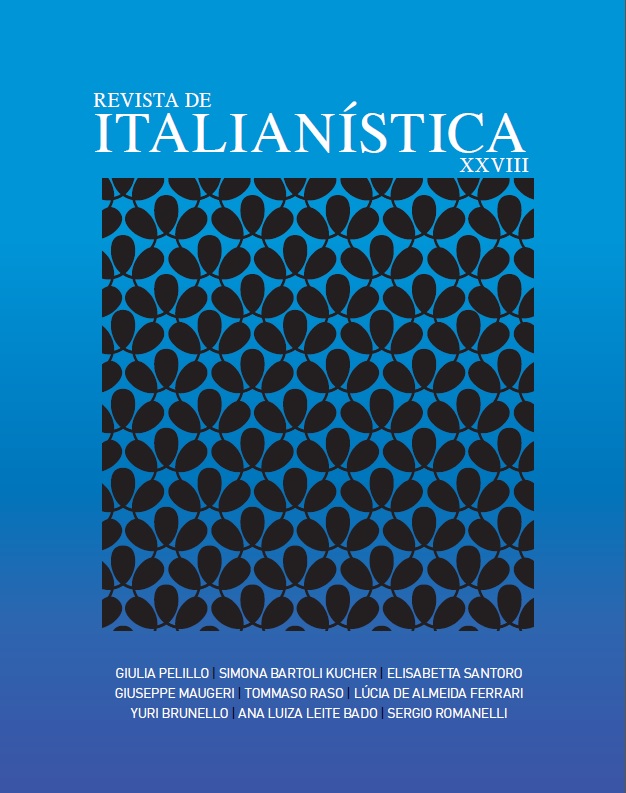Media e promotion of plurilingualism in Europe: a transdisciplinary itinerary
DOI:
https://doi.org/10.11606/issn.2238-8281.v0i28p4-19Keywords:
Pluriligualism, Media, Language policy, Transcultural studiesAbstract
The article focuses on the promotion and protection of cultural diversity by comparing the language policy of the European Union with common attitudes and discourse practices in the national public sphere. While the EU regards diversity - linguistic and cultural in general - as a foundation of the European identity, established discourse practices in the public debate still express a monolingual ideology, typical of the tradition of the nation state. At the same time the role played by media seems to be underestimated in the debate on language policy. Following a transdisciplinary path, which compares the sociological, sociolinguistic, socio-anthropological and philosophical approach with the advances in cultural studies, it appears that the research of the last years tends to emphasize the procedural and dynamic character of cultural identity by conceptualizing it in terms of capital rather than heritage. A transcultural approach in the study of language diversity promises advantages both from a theoretical and from an applied point of view: on the one hand it allows the description of the complex cultural dynamics arising in the context of globalization, on the other it implies a better handling, also in a discursive sense, of superdiversity (Vertovec 2009), a term which underlines the multilayered character of contemporary cultural identities. Beside the potential and the challenges of superdiversity the role played by media in promoting or, on the contrary, in frustrating the efforts started in other fields - like education, politics or research -, in order to construct a European culture of diversity, could be decisive.
Downloads
References
ANDERSON, B. Imagined Communities: Reflections on the Origin and Spread of Nationalism. London: Verso, 1983.
BLOMMAERT, J. The Sociolinguistics of Globalization. Cambridge: Cambridge University Press, 2010.
BLOMMAERT, J.; RAMPTON, B. Language and Superdiversity. Diversities, 13, 2: pp. 1-21, 2011.
BOURDIEU, P. La distinction: critique sociale du jugement. Paris: Éditions de Minuit, 1979.
BOURDIEU, P. Ce que parler veut dire: l’économie des échanges linguistiques. Paris: Fayard, 1982.
BREMER, J. Jede Woche eine Schule besuchen. Frankfurter Allgemeine Zeitung, 2: Mar. 2014.
BRÜGGEMANN, M.; HEPP, A.; KLEINEN-VON KÖNIGSLÖW, K.; WESSLER, H. Transnationale Öffentlichkeit in Europa: Forschungsstand und Perspektiven. Heidelberg: Springer, 2009.
BUSCH, B. Sprachen im Disput: Medien und Öffentlichkeit in multilingualen Gesellschaften. Klagenfurt: Drava, 2004.
BUSCH, B. Das sprachliche Repertoire oder Niemand ist einsprachig. Klagenfurt: Drava, 2012.
CANCLINI, N. G. Culturas híbridas. Barcelona: Debolsillo, 2009.
COMMISSIONE EUROPEA. Europeans and their Languages. 2012, http://ec.europa.eu/public_opinion/archives/ebs/ebs_386_en.pdf. Ultimo accesso: 23 maggio 2014.
DE MAURO, T. Storia linguistica dell’Italia unita. Roma: GLF editori Laterza, 2011.
DIJK, T. A. Society and Discourse: how Social Contexts influence Text and Talk. Cambridge; New York: Cambridge University Press, 2009.
EHLICH, K.; SCHUBERT, V.; STICKEL, G. Sprachen und Sprachenpolitik in Europa. Stellenbosch Papers in Linguistics PLUS 38, pp. 26-41, 2009.
ENGIN, H.; OLSEN, R.; NAYHAUSS, H. C. Interkulturalität und Mehrsprachigkeit. Baltmannsweiler: Schneider Verlag Hohengehren, 2009.
HALL, S. (a cura di). Representation: Cultural Representations and Signifying Practices, Los Angeles: SAGE, 2011.
HELLER, M. (a cura di). Bilingualism: a Social Approach. Basingstoke: Palgrave Macmillan, 2007.
HEPP, A. Medienkultur: Die Kultur mediatisierter Welten. Wiesbaden: VS Verlag für Sozialwissenschaften, 2013.
HERRERAS, J. C. (a cura di). L‘Europe des 27 et ses langues. Valenciennes: Presses universitaires de Valenciennes, 2011.
INTRAVAIA, S. Dagli alunni ai prof in crisi, vademecum per Renzi e Giannini sui mali della scuola. La Repubblica, 3 mar. 2014, http://www.repubblica.it/scuola/2014/03/03/news/i_mali_della_scuola_vademecum_per_renzi_e_giannini-80110874/?ref=search. Ultimo accesso: 22 maggio 2014.
JOHNSON, S. A.; ENSSLIN, A. (a cura di). Language in the Media: Representations, Identities, Ideologies. London: Continuum, 2007.
KELLY-HOLMES, H.; MILANI, T. M. (a cura di). Thematising multilingualism in the media. Amsterdam: Benjamins, 2011.
LANGENBUCHER, W. R. (a cura di). Europäische Öffentlichkeit und medialer Wandel: eine transdisziplinäre Perspektive. Wiesbaden: VS Verlag für Sozialwissenschaften, 2006.
MAKONI, S.; PENNYCOOK, A. Disinventing and Reconstituting Languages. In: MAKONI, S.; PENNYCOOK, A. (a cura di). Disinventing and Reconstituting Languages. Clevedon: Multilingual Matters, 2007.
MARTIN-JONES, M.; BLACKLEDGE, A.; CREESE, A. (a cura di). The Routledge Handbook of Multilingualism. London: Routledge, 2012.
MORLEY, D.; ROBINS, K. Spaces of Identity. Global Media, Electronic Landscapes and Cultural Boundaries. London [et al.]: Routledge, 2004.
OSSERVATORIO EUROPEO DEL PLURILINGUISMO. Carta europea del plurilinguismo, 2005, http://www.observatoireplurilinguisme.eu/images/Fondamentaux/charteplurilinguisme_itv2.13.pdf. Ultimo accesso: 23 maggio 2014.
RAMPTON, B. Language in Late Modernity: Interaction in an Urban School. Cambridge: Cambridge University Press, 2006.
SIMONE, R. Specchio delle mie lingue. Italiano e oltre 2, 1987, pp. 53-59.
VERTOVEC, S. Transnationalism. London: Routledge, 2009.
VOLMAR, A. (a cura di). Auditive Medienkulturen: Techniken des Hörens und Praktiken der Klanggestaltung. Bielefeld: Transcript, 2013.
WELSCH, W. Was ist eigentlich Transkulturalität?, 2010, http://www2.uni-jena.de/welsch/tk-1.pdf. Ultimo accesso: 23 maggio 2014.
WESSLER, H.; PETERS, B.; BRÜGGEMANN, M.; KLEINEN-VON KÖNIGSLÖW, K.; SIFFT, S. Transnationalization of Public Spheres. Basingstoke: Palgrave Macmillan, 2008.
Downloads
Published
Issue
Section
License
Copyright (c) 2014 Revista de Italianística

This work is licensed under a Creative Commons Attribution-NonCommercial-NoDerivatives 4.0 International License.
A revista retém os direitos patrimoniais dos artigos e os publica simultâneamente sob uma Licença Creative Commons-Atribuição-Não Comercial-Sem Derivações.



